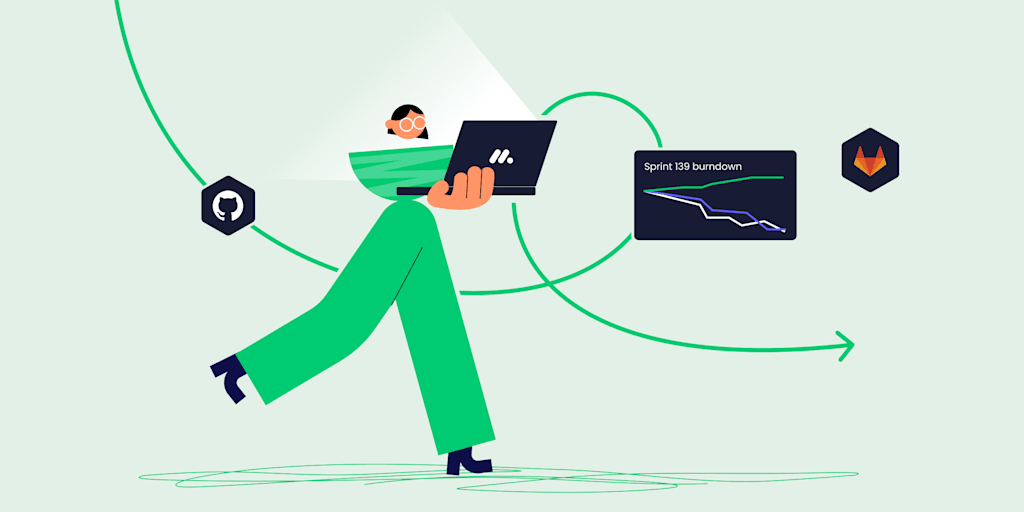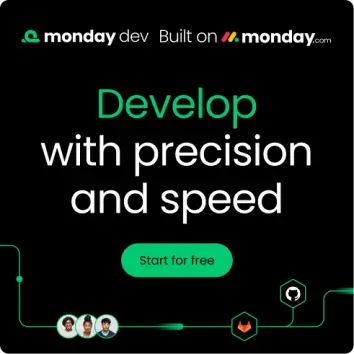Product teams are under constant pressure to ship faster and make smarter bets. Yet, they often rely on a mix of gut feelings, loud opinions, and incomplete data to prioritize what to build next. This approach slows down development and puts business outcomes at risk.
The rise of AI for product managers provides a clear path forward, turning messy data into actionable insights. This post explores the essential AI platforms that automate research and planning. We will also walk through practical strategies for using AI to optimize your roadmap, accelerate delivery, and build a more data-driven culture.
By embedding intelligence directly into your workflows, you can remove guesswork and give your team the confidence to focus on high-impact work. Remember, the goal is to create a development process that is not only faster but also more aligned and adaptable to change.
Try monday devKey takeaways
- AI transforms product management by automating routine projects and revealing data patterns you’d miss manually. Start with user feedback analysis and sprint planning to see immediate impact.
- Focus on practical AI skills like data interpretation and prompt engineering rather than technical expertise. You can become AI-proficient in 2-3 months through hands-on practice.
- Features within monday dev like AI Blocks automatically categorize feedback, assign tasks by expertise, and predict project delays before they happen. It adapts to your workflow instead of forcing rigid processes.
- Choose AI platforms that solve specific problems like user research, roadmap planning, or team collaboration. Avoid chasing technology trends — focus on platforms that deliver measurable business value.
- Successful AI adoption requires gradual implementation with leadership buy-in and clear ROI metrics. Start with pilot projects that demonstrate quick wins before scaling across your team.
What is AI for product management?
AI for product management is the use of artificial intelligence technologies to help product teams make smarter decisions and work more efficiently, and its adoption is growing. A 2023 McKinsey survey found that businesses adopted AI in at least one function. This means using machine learning, natural language processing, and predictive analytics to automate routine tasks and uncover insights from data.
AI works like an intelligent assistant that can analyze thousands of customer reviews in minutes, predict which features users will love, and even write your meeting notes, especially when using robust product management software. It doesn’t replace your judgment — it gives you superpowers to process information faster and spot patterns you might miss.
The role of AI in modern product development
AI transforms how you build products by shifting from guesswork to data-driven decisions, aligning seamlessly with agile product management philosophies. Instead of relying only on surveys or stakeholder opinions, you can analyze real user behavior across millions of interactions.
Machine learning helps you predict user churn before it happens. Natural language processing turns messy feedback into clear themes. Predictive analytics further identifies which features will actually move the needle on your business metrics.
Key benefits AI delivers for product teams
AI gives product teams concrete advantages that directly impact business outcomes. Many teams report seeing faster delivery times, witnessing smarter resource allocation, and gaining deeper customer understanding.
Here’s some of the definitive benefits AI can bring to your product development process:
- Faster time-to-market: Automate documentation, research, and reporting to focus on strategic decisions. According to a 2023 McKinsey report, generative AI can help reduce software development time by as much as 30%- 50%.
- Smarter prioritization: Predict which features will succeed based on data, not opinions, and align them with OKRs for product management.
- Proactive problem-solving: Spot bottlenecks and risks before they derail your product roadmap.
- Deeper customer insights: Uncover hidden patterns in feedback that manual analysis misses
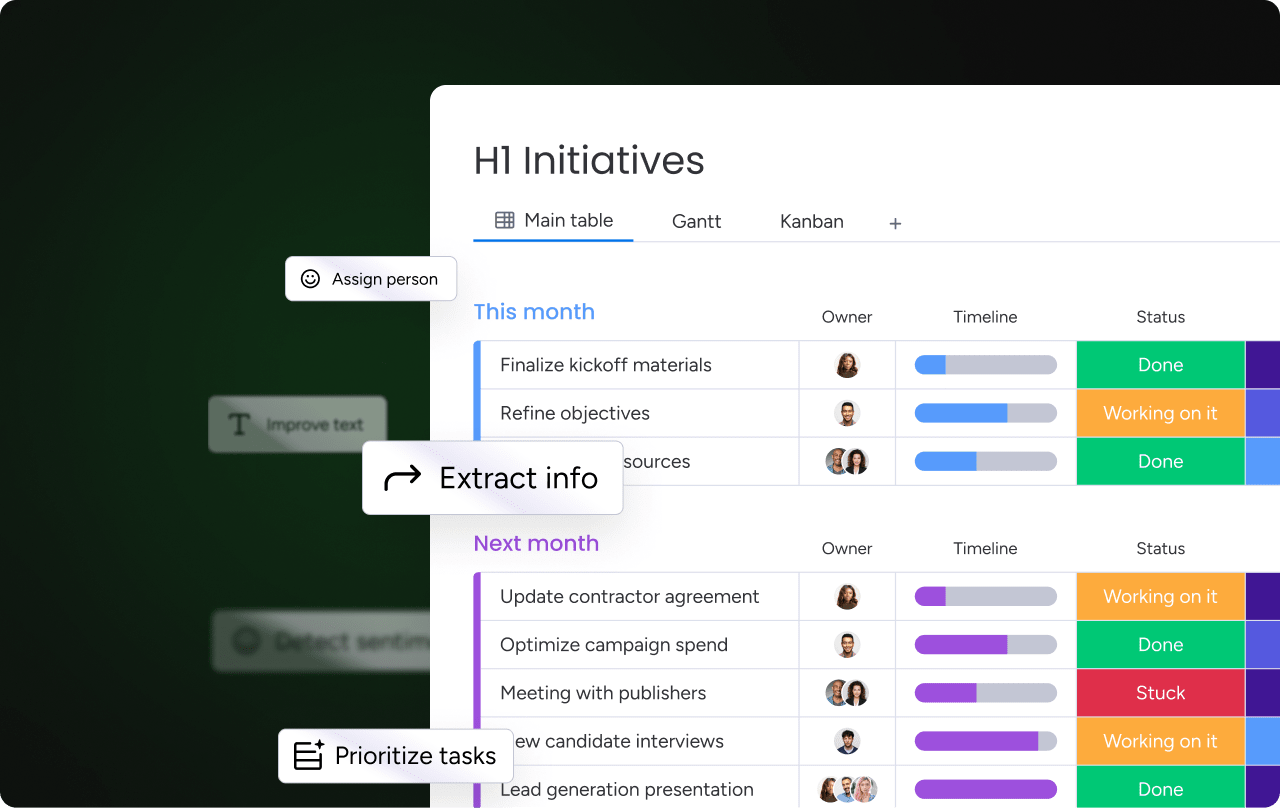
15 must-have AI platforms for product managers
The right AI platforms can transform how you discover opportunities, use product roadmap software, and deliver products. These platforms can also handily integrate with your existing workflow while adding intelligent automation and insights.
AI platforms for user research and discovery
User research platforms powered by AI process thousands of customer interactions simultaneously. They excel at finding patterns and insights that would take weeks to uncover manually.
- Sprig: Automates survey deployment and analyzes open-ended responses to surface actionable insights. Pricing starts at $175/month.
- Thematic: Processes support tickets and reviews to identify recurring themes. Custom pricing based on data volume.
- Dovetail: Analyzes user interviews and research data to find patterns across sessions. Plans from $39/user/month.
AI platforms for roadmap planning and prioritization
Deciding which features to build and when can make or break a product strategy. AI platforms help simplify this process by weighing customer feedback, business goals, and development effort to recommend the best sequence of initiatives. Some leading options include:
- airfocus: Scores features based on impact and effort with visual prioritization matrices. Plans start at $19/editor/month.
- ProdPad: Uses AI to recommend roadmap priorities aligned with customer feedback and business objectives. From $24/user/month.
- Productboard: Connects user insights to feature prioritization with AI-powered scoring. Plans start at $19/maker/month.
AI platforms for documentation and PRD creation
Documentation platforms with AI have the power to turn your rough notes into polished product requirements. They can also help maintain consistency and save hours of writing time. Some of the most popular platforms include:
- Notion AI: Converts meeting notes into structured PRDs and generates acceptance criteria. From $8/user/month.
- Coda AI: Creates technical specs from user stories automatically. From $10/user/month.
- Confluence: Summarizes discussions and creates documentation templates. From $5.75/user/month.
AI platforms for analytics and performance tracking
Analytics platforms powered by AI help you understand not just what happened, but what will happen next. The best ones also help predict user behavior and identify optimization opportunities. Popular products on the market include:
- Mixpanel: Predicts churn and identifies retention opportunities through behavioral analysis. Free tier available, paid from $20/month.
- Amplitude: Analyzes adoption patterns and generates automated insights. Free tier, paid from $49/month.
- Heap: Surfaces hidden user insights and automates funnel analysis. Free tier with custom pricing for advanced features.
AI platforms for team collaboration and workflow
Keeping teams aligned and productive is one of the toughest challenges in software development. AI-powered collaboration platforms help by streamlining communication, automating routine tasks, and surfacing insights that keep projects on track.
Among these options, monday dev adapts to the way your team works instead of imposing rigid processes. Its AI Blocks can:
- Categorize feedback automatically
- Assign projects based on expertise
- Generate clear project summaries
- Predict delays during sprint planning with built-in analytics
Pricing starts at $10/seat/month.
Other notable platforms include:
- ClickUp AI: Automates progress reporting and detects resource conflicts. From $7/user/month.
- Linear: Suggests task priorities and predicts completion times. From $8/user/month.
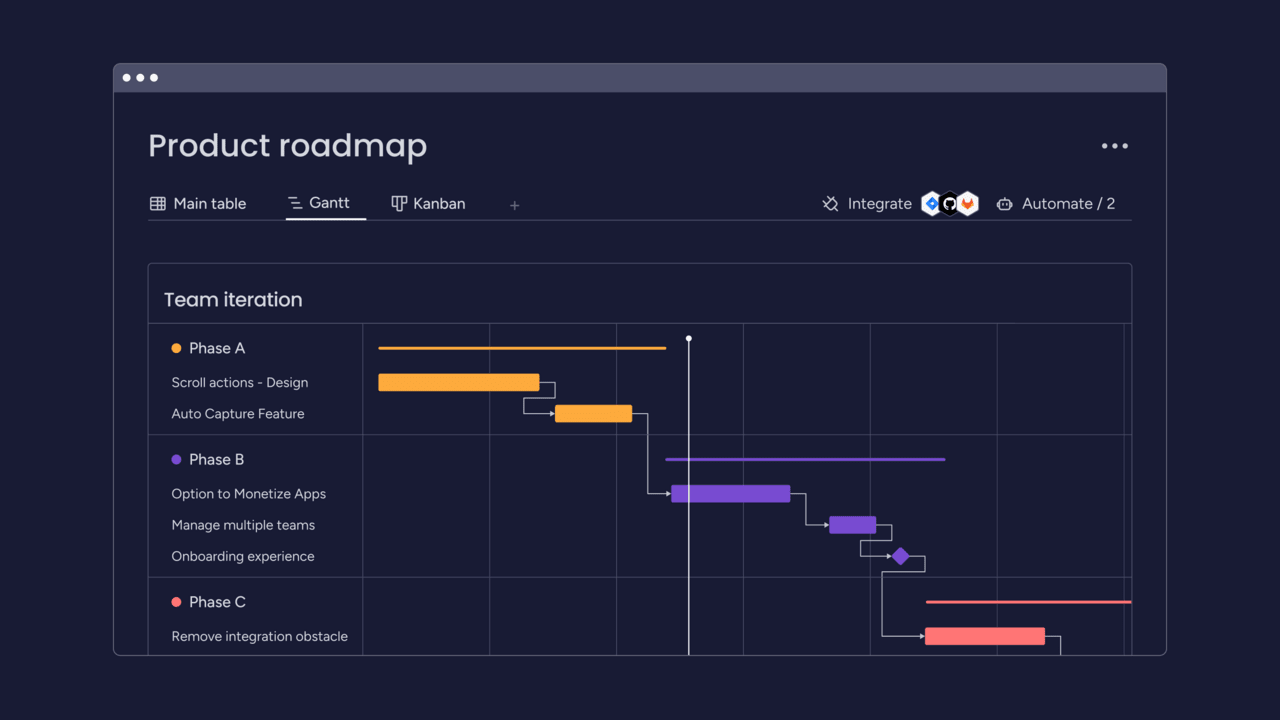
10 powerful AI strategies for product development
Product development is full of daily challenges — from sifting through endless user feedback to balancing team capacity and keeping documentation up to date. AI is now stepping in to take on the heavy lifting, giving product managers more time to focus on strategy, innovation, and delivering real value to users.
Below are ten practical strategies that show how AI can transform the product development process. Each one tackles a specific pain point with clear, actionable benefits your team can put into practice.
1. Automate user feedback analysis at scale
Manually processing feedback is slow and often leads to valuable insights being overlooked. AI-powered analysis makes this process faster and more accurate by:
- Categorizing thousands of comments instantly to surface key themes.
- Highlighting user needs and priorities that might otherwise get buried.
- Routing insights to the right team members so action can be taken quickly.
With monday dev’s AI Blocks, feedback is automatically sorted by theme and urgency, ensuring every critical user request is captured, prioritized, and addressed.
2. Accelerate product discovery with AI-powered insights
Traditional discovery methods like focus groups give you limited data. AI analyzes your entire user base to reveal behavior patterns and unmet needs, making product discovery much faster.
Machine learning clusters users into distinct personas. Predictive models show which problems are worth solving. monday dev visualizes these insights in real-time dashboards that update as new data arrives.
3. Optimize sprint planning and velocity predictions
Past sprints contain valuable patterns. AI analyzes this data to predict realistic timelines and prevent overcommitment.
monday dev’s predictive engine examines your team’s historical performance and current capacity. It suggests optimal workloads and flags risks before they impact delivery, seamlessly supporting agile roles on your team.
4. Enhance prioritization with predictive analytics
Feature prioritization often relies on gut feelings. AI analyzes user behavior, market trends, and competitive data to predict actual impact.
With monday dev’s scoring systems, you can visualize trade-offs between features. The platform shows you which initiatives will drive the most value based on multiple business variables.
5. Streamline knowledge management and documentation
Keeping documentation current is tedious but essential. AI automatically generates docs from meetings, updates specs when code changes, and maintains searchable knowledge bases.
monday dev’s Digital Workforce summarizes meetings and updates documentation without manual effort. Your team always has access to current information, supporting effective product lifecycle management.
6. Improve cross-team resource allocation
Assigning the right tasks to the right people is rarely straightforward. It requires balancing skills, availability, and workload — something AI can simplify by:
- Analyzing team capacity to prevent overload.
- Matching tasks to individual strengths for better outcomes.
- Distributing work fairly to keep teams balanced and engaged.
With monday dev’s workload features, assignments are optimized automatically. The platform recommends resource distribution while factoring in each person’s skills and bandwidth, helping teams stay productive without burning out.
7. Identify and prevent development bottlenecks
Bottlenecks often arise from the complex interplay of tasks, people, and dependencies. AI continuously monitors these factors to spot risks early and predict where problems may occur. With monday dev, at-risk milestones are highlighted and workflow improvements are suggested, allowing teams to address issues before they slow progress or delay a launch.
8. Personalize user experiences with AI
Users expect products that adapt to their needs. AI enables personalization at scale by analyzing behavior patterns and preferences.
Track personalization experiments in monday dev to measure impact. The platform’s analytics show you which variations drive engagement.
9. Automate testing and quality assurance
Manual testing can be slow and prone to errors, but AI streamlines the process by generating test cases, detecting bugs, and ensuring thorough coverage. Through integrations with leading testing platforms, monday dev gives teams clear visibility into quality metrics, making it easier to maintain high standards while accelerating release cycles.
10. Scale support with intelligent automation
Support tickets hold valuable product insights, but the volume can quickly overwhelm teams. AI helps manage the load by:
- Handling routine inquiries automatically to free up team capacity.
- Surfacing patterns in support requests that highlight product improvements.
- Prioritizing issues effectively so critical cases are resolved first.
- Tracking resolution trends to improve long-term support efficiency.
With built-in automation, monday dev routes tickets, prioritizes issues, and highlights recurring patterns. The result is faster resolution times, happier customers, and a more organized product backlog.
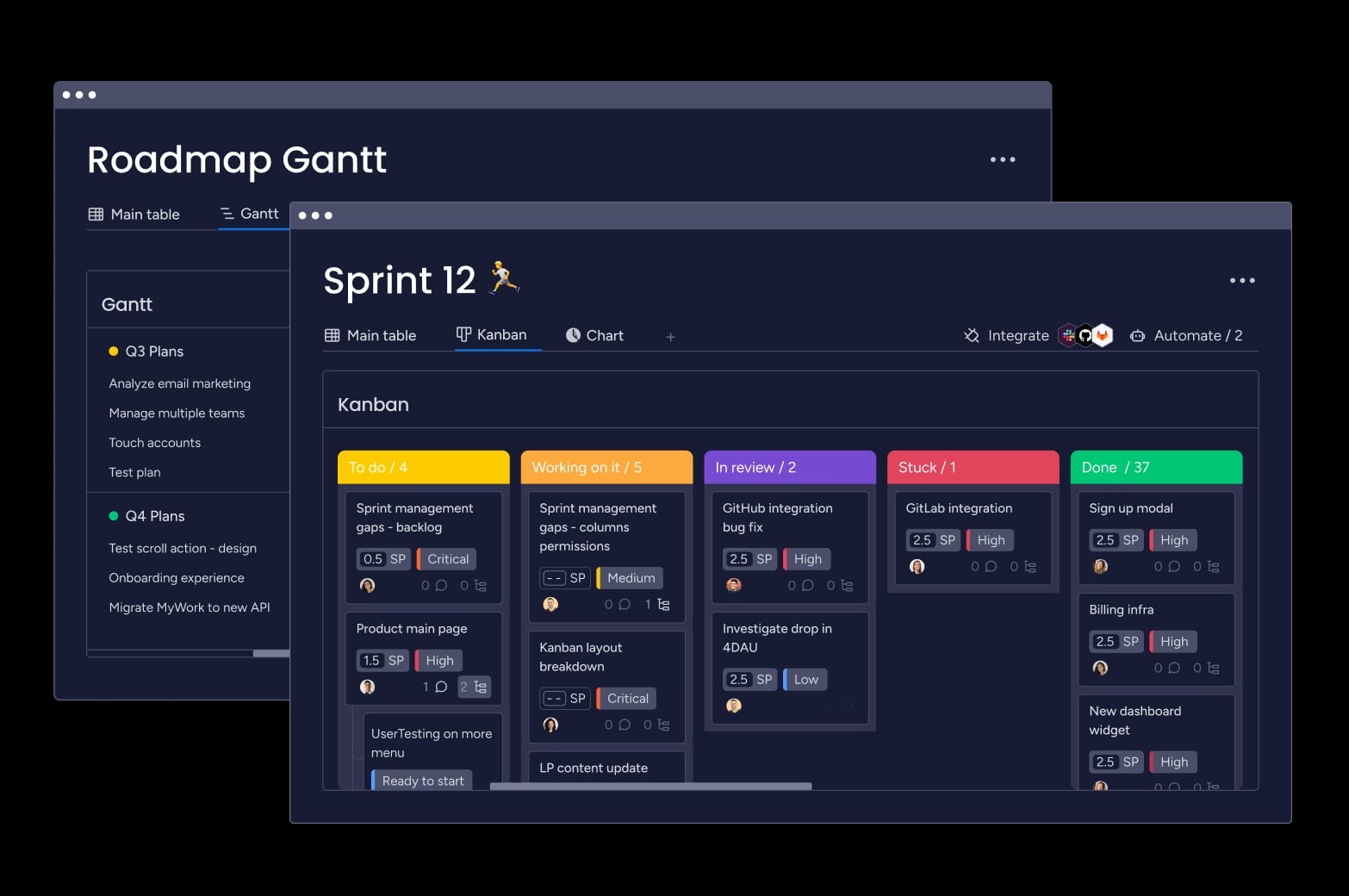
How to build essential AI skills as a product manager
AI is becoming a core part of modern product development, but you don’t need to be a data scientist to take advantage of it. What matters most is building practical skills that help you evaluate AI outputs, integrate them into workflows, and use them to make better product decisions. By developing the right competencies, product managers can confidently guide their teams through AI adoption and keep strategy focused on delivering value.
Core AI competencies every PM needs
- Data interpretation: Learn to read AI insights and know when to trust or question recommendations.
- Prompt engineering: Write clear instructions that get useful outputs from AI platforms.
- Bias detection: Recognize when AI suggestions might be skewed or incomplete
- Integration planning: Understand how AI fits into your existing workflows.
Practical ways to learn AI while you work
The best learning happens through real application. Start small with low-risk experiments, such as developing an MVP in project management initiative.
Try AI platforms on actual projects. Use ChatGPT for meeting summaries. Test AI-powered analytics on your current metrics. Further, join product management communities where peers share AI experiences.
Developing an AI-first product mindset
Shift your thinking to spot AI opportunities everywhere. Look for repetitive tasks that drain time. Find data-rich processes that could yield insights. Identify decisions that would benefit from prediction.
Remember that AI enhances human judgment — it doesn’t replace it. Use AI to handle routine work so you can focus on strategy and product innovation.
Try monday devAI certification and training options for product managers
As AI becomes more embedded in product development, product managers need practical ways to build confidence and credibility with these tools. Certifications, online courses, and free resources provide flexible paths to learn at your own pace — whether you’re looking for a quick introduction, hands-on practice, or a deeper dive into real-world case studies.
Below, you’ll find some great options to help you strengthen your AI skills and apply them directly to product management.
Top AI certifications for product professionals
| Certification | Duration | Cost | Best For |
|---|---|---|---|
| IBM AI Product Manager | 3-6 months | $39/month | Comprehensive foundation |
| Google AI for PMs | 4 weeks | Free | Quick introduction |
| Coursera AI Specialization | 2-4 months | $49/month | Hands-on projects |
| Udacity AI Nanodegree | 2-3 months | $399/month | Deep case studies |
Online courses and learning platforms
- Coursera: Hands-on projects with real-world applications.
- edX: Andrew Ng’s “AI for Everyone” for non-technical PMs.
- DataCamp: Interactive exercises focused on practical skills.
- LinkedIn Learning: Short courses on specific AI applications.
Free resources to start your AI journey
- YouTube channels: “AI for Product Managers” and “Product School” for regular content.
- Open platforms: Hugging Face and OpenAI Playground for experimentation.
- Industry blogs: Mind the Product and Towards Data Science for AI insights.
- Free trials: monday dev, Mixpanel, and Notion AI for hands-on practice.
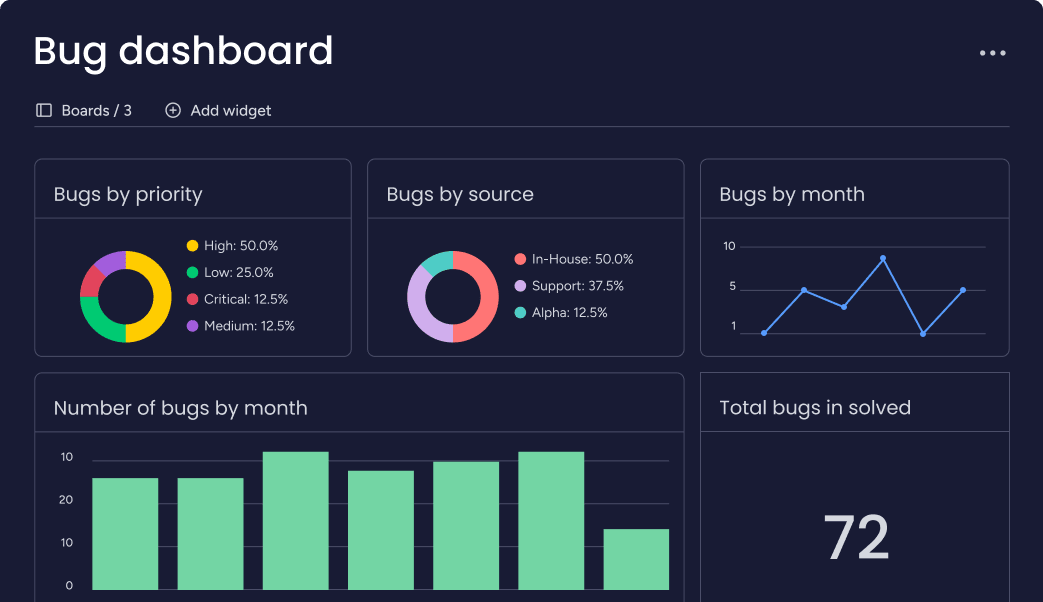
Best practices for implementing AI in product teams
AI can unlock major advantages for product teams, but success depends on how it is introduced and managed. From gaining leadership support to tracking ROI and addressing adoption challenges, following best practices ensures AI strengthens both your workflow and your outcomes.
Securing leadership buy-in for AI initiatives
Frame AI investments in business terms. Show specific problems AI will solve and expected outcomes.
Start with pilot projects that demonstrate quick wins and tie them into your product strategy. Address security concerns upfront, as 52% of large enterprises cite security as the biggest barrier to AI adoption. Present competitive analysis showing market trends. Provide realistic timelines including training needs.
Measuring impact and ROI of AI platforms
- Time savings: Hours saved on routine tasks.
- Decision accuracy: Improvement in prediction success rates.
- Error reduction: Decrease in manual mistakes.
- Team productivity: Increase in output quality and quantity.
Avoiding common AI adoption pitfalls
- Over-reliance: Always maintain human oversight and validation.
- Data quality: Clean your data before implementing AI.
- Change resistance: Invest in training and communication.
- Integration issues: Test thoroughly before full deployment.
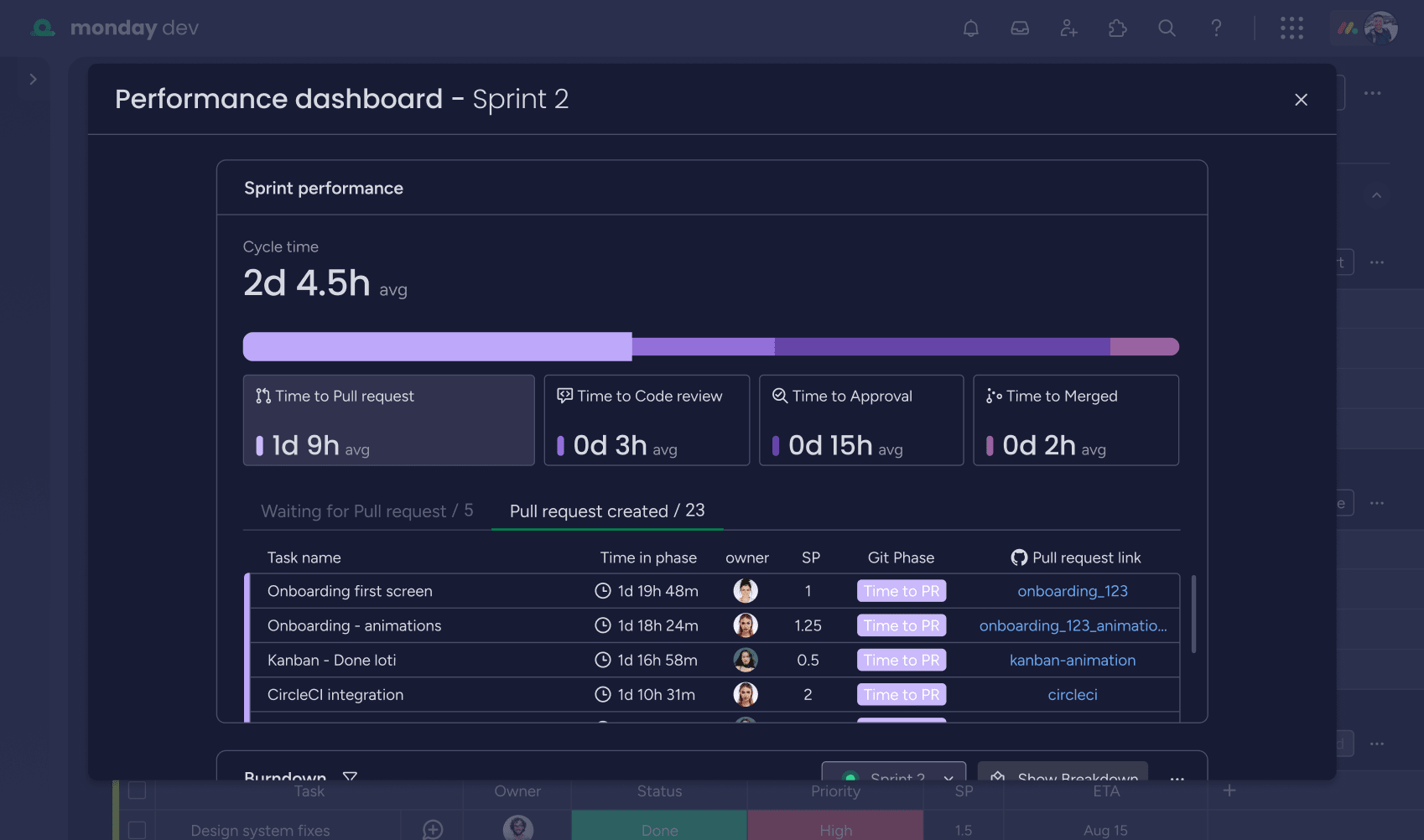
How monday dev transforms product development with AI
AI-powered automation that works your way
AI Blocks in monday dev integrate directly into your workflows to create a truly adaptive system. They can automatically categorize user feedback into actionable themes, assign tasks to the right team members based on expertise and availability, and generate comprehensive meeting summaries with clear action items.
With the Custom Block feature, you simply describe what you need in plain language — whether it’s automating sprint planning, generating status reports, or predicting resource bottlenecks. The AI then builds the automation for you, no coding required, saving teams up to 6 hours per week on routine tasks.
Real-time visibility across your entire product lifecycle
The predictive analytics engine in monday dev helps identify potential delays and scope creep before they disrupt delivery. By analyzing historical sprint data, team velocity, and current workloads, it can forecast completion dates with up to 85% accuracy.
Routine tasks such as status updates, documentation maintenance, and progress tracking are handled by the Digital Workforce, keeping data accurate and up to date. Interactive dashboards then bring everything together, visualizing project health, team performance, and resource allocation in real time so you always know what’s on track and what needs attention.
Seamless integration with your existing tech stack
Integration with more than 200 tools — including Jira, GitHub, Slack, and Figma — means your team can keep working with the platforms they already know. Two-way synchronization turns everything into a centralized command center for product data without disrupting established workflows.
Through these integrations, AI insights flow across your entire ecosystem. For example:
- Automatic updates: Task statuses adjust instantly when code is committed in GitHub.
- Smarter forecasting: Timeline predictions recalculate based on the latest changes.
- Stakeholder alignment: Notifications keep the right people informed at the right time.
This intelligent coordination reduces context switching by up to 40% and improves cross-functional alignment across teams.
Ready to see how seamlessly AI can fit into your workflows? Try monday dev today and experience automation that adapts to you.
Try monday devFrequently asked questions
What is the difference between an AI product manager and a traditional product manager?
The primary difference between an AI product manager and a traditional product manager is that an AI PM specializes in building AI-powered products, requiring knowledge of machine learning, data science, and AI ethics. In contrast, traditional product managers work across all product types without needing deep AI expertise.
How long does it take to learn AI skills as a product manager?
Basic AI literacy takes two to three months of online courses and hands-on practice. Advanced AI product management skills require six to twelve months of dedicated learning and real-world application.
Which AI certification is best for product managers in 2025?
The IBM AI Product Manager Professional Certificate and Google's AI for Product Managers course offer the most comprehensive training. Both provide practical skills with industry recognition tailored for product roles.
Can AI eventually replace product managers?
AI enhances product manager capabilities but cannot replace strategic thinking, stakeholder management, and creative problem-solving. Product managers who embrace AI become more effective by focusing on high-value decisions.
What salary premium can AI-skilled product managers expect?
Product managers with AI expertise typically earn 15-25% more than traditional counterparts. Premiums vary by company size, industry, and specific AI skills demonstrated.
Do product managers need coding skills to work with AI platforms?
Most AI platforms for product managers are accessible through visual interfaces and natural language, allowing you to use them without coding knowledge. Basic understanding of data concepts and APIs helps with advanced implementations and engineering communication.
